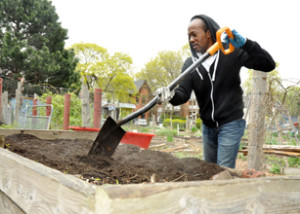
Workers are getting a community vegetable garden in Parkdale ready for another growing season.
Turning Parkdale backyards into food production could yield two things—one, lots of fresh vegetables for low-income residents, and two, the pairing of marginalized people with the general public to work in the backyard “farms.”
One Parkdale worker sees the pairing aspect as an opportunity to bring the “solitudes” together so each can get a better understanding of the other in the calm atmosphere of gardening.
Right now Parkdale has a few community gardens growing vegetables on public land, as is the case in Cowan Ave. park. But what about getting private landowners involved? There are a lot of empty backyards that could be producing food at low cost.
This idea of extending urban agriculture beyond public land is being explored by three Parkdale groups: the West End Food Coop, Greenest City, and the Parkdale Activity-Recreation Centre (PARC).
Victor Willis is executive director of PARC, a multi-service agency that provides support to psychiatric survivors, low income and marginalized people.
“In my mind [the pairing] breaks down the assumptions and barriers about who these people are,” says Willis. When the general public works with PARC clients they realize “they’re a person just like me,” he says.
“We really want to bridge the different experiences that can remain solitudes unless you find opportunities to do something together,” says Willis.
Emma Rooney, Greenest City program manager, has the same view. “Gardening and food gardening especially is a very easy way to connect people. It’s easy to find common goals for people that are coming from very different backgrounds. The garden tends to create a safer place for people to interact.”
Backyard farms could work in an arrangement similar to that used by Not Far From The Tree (NFFTT), which organizes volunteers to pick fruit in the backyards of consenting homeowners. In the end the homeowner, the volunteers and local food banks each get a third of the harvest.
In addition to getting homeowners involved in food production, Willis says the idea of acquiring land (that would be held in trust by a community-based governing body) is also being looked at for food production.
The existing community vegetable gardens in Parkdale are not allowed to sell produce because they’re based on public land. In order to sell produce at a south Parkdale market—an idea that is being explored—the food would have to come from non-public land.
“Our goal is to have a body that is representative of the community that can hold onto the land,” says Willis. “We want to create an entity that is accountable to the stakeholders.” Stakeholders could include local businesses, residents, tenants and non-profit agencies.
Already, Willis says local food workers have their eye on land about one-eighth of an acre near Queen and Cowan that could be held in trust for growing vegetables.
Rooney points out another reason why a land trust would be necessary—the governing body can keep it without fear of developers getting their hands on it.
Whereas a private landowner might readily sell it for big dollars, the land trust group can simply tell developers to take a hike—the land is staying in food production.
“If you don’t own your land, it doesn’t matter how invested you are in your community garden, it can be taken away,” says Rooney.
When the community has its own vegetable garden the growers can decide what foods they want to plant. “The exciting part about growing vegetables is the opportunity to grow more diverse things that aren’t available at the grocery store,” says Rooney.
“Parkdale is a very diverse community and it can be challenging for people when they’re not able to find the vegetables that they’re used to preparing.”
Willis says opportunities to increase food production should be welcomed.
“I think food security and food access and access to growing food will become tighter and tighter and as that happens … exploring an alternative way of doing it is very important.”
 TheBulletin.ca Journal of Downtown Toronto
TheBulletin.ca Journal of Downtown Toronto

